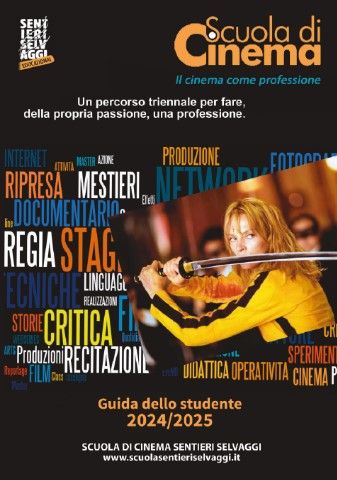Guest of the Pesaro New Cinema Exhibition which dedicated the monograph to him To hell! Works, films and cinema by Franco Maresco, curated by Fulvio Baglivi, the director from Palermo connected remotely for a meeting with the public moderated by Pedro Armocida, in which he spoke with various figures from the Italian critical panorama. With his usual sharp tone, Maresco spoke about his work on the mafia, but also about the current state of cinema and its future, between technology and artificial intelligence.
————————————————– ————
FILM PRODUCTION AND DISTRIBUTION COURSE: ONLINE FROM 15 JULY
————————————————– ————
Starting from Enzo, tomorrow in Palermo!the only film in the Pesaro program by Ciprì and Maresco, then passing through Belluscone And The mafia is no longer what it used to be, the director reflected at length on his way of telling the story of the mafia, in what Baglivi himself defined as three definitive films: “Belluscone And The mafia is no longer what it used to be they are two films that in some way can be considered definitive, but there is nothing mythomaniacal, presumptuous, because I’m not referring to the aesthetic result. I am, and I would be hypocritical if I didn’t recognize this, because I believe that already 40 years ago I did work around the mafia in all forms, TV, cinema, theater, even before that cartoons when I was young, and I think I know well what is the mafia. I am from Palermo, born and raised in a period in which you could breathe the mafia, there was daily interaction. Falcone was right when in an interview he said that you cannot understand Sicily if you are not Sicilian. He saw the mafia not only as a criminal phenomenon, but as something that brought with it a cultural world, a centuries-old mindset, a whole series of codes, gestures, something infinitely difficult.”
—————————-
UNICINEMA QUADRIENNIALE: DOWNLOAD THE COMPLETE GUIDE!
—————————-
Goes on: “I think in that period Cynical TV it was something new compared to what had previously existed and compared to what would soon no longer be possible, also for reasons of transformation of the technological means of use. That Sicilian world, on the one hand the mafia but on the other also the vision of Sicily, was rather conventional. Before Ciprì and I arrived, there was a bit of the metaphysics of the mafia, think of Petri’s film All Waybut also Excellent corpses by Rosi. It was seen as something distant, the mafia was a mystery, to the point of reaching an almost metaphysical form of abstraction. Here, we, Ciprì and I, have brought with our work an unprecedented reading of Sicily, of Palermo, and therefore this humorous component in the image, in the bodies, in the actors. TOwe made a unique work on the mafia that was also insightful, mercilessly critical of the ways in which it was told, a mockery of that postcard-like vision, so full of clichés. THEn Enzo, tomorrow in Palermo! I still cared about the man, I still cared about the pieces of shit. I was interested in that human part, I was interested in the inner parts of human beings, of mafiosi, even the most ruthless and this has no longer been feasible for a long time. The mafia, as Sciascia saw it and as Sciascia talked about it, with this almost metaphysical connection to power, no longer exists. AND Belluscone And The mafia is no longer what it used to be they are exactly the elimination of meaning of our time. There is no longer good and evil, there is no longer mafia, there is no longer anti-mafia. We are in the society of the spectacle. It’s over”.
He then continued: “Everything good and interesting that has been done in cinema about the mafia has been done by the Americans, Scorsese, Coppola… I mean precisely for psychology. Although it is the Italian-American mafia. Then for the rest, if you put Rosi and take something away, nothing else exists. The rest is an offense to the anti-mafia spirit, an offense to the Sicilians. At a certain point I brought up a neologism, Camillerism. I’m not talking about Camilleri as a person, Camilleri was a very skilled, extraordinary conversationalist, a teller of crazy anecdotes. But Camillerism isn’t his fault, it’s what comes from the adaptation of his works, those tourist postcards sponsored by the Sicilian culture and entertainment department, it’s really a mindset. It is a sweetened, holographic, postcard-like vision of Sicily and the world. So let’s say that in cinema there is Camillerism. Everywhere there is Camillerism”.
But how can you continue making films if it’s all over? “There are people, we used to call them artists but here no one is an artist, let’s say directors, who have the mechanisms of self-delusion, who delude themselves, make fun of themselves. Others are aware of this and this clearly leads them to pay a price. This ruthlessly self-critical and critically desperate vision continues to exist. But cinema personally hasn’t given me anything for a long time. Either I am unsuitable, and this is probably the case, with respect to cinema, or cinema clearly has something wrong with it. The methods and language that it has now assumed, the working methods, the processing times and everything. So it’s clear that I don’t have a relationship with cinema that can be remotely comparable to that of many years ago. Cinema is dead. Once upon a time we took a position in cultural matters, in cinema, in books. A real position. This is no longer there. It’s just general molasses. So when they ask me ‘How do you find yourself in this world?’ Bad. Because it no longer works productively. Because the public always acquits itself or is always acquitted. The public is guilty. The public is not always right. There is no reason why a film makes 40 million euros in Italy, because that film, with that black and white, is bad. Yet 40 million people say it’s beautiful.”

————————————————– —–
THE WILD TRAILS DOCUMENTARY SCHOOL
————————————————– —–
And, speaking of the production mechanisms, he added: “AND finished politically, there is no autonomy of thought, if you have to make a film it must have certain guarantees, it must end up on the platforms. They are all directors, they are all actors, they are all screenwriters, they are all writers, they are all creatives. And this is powerfully linked to this unavoidable revolution in technology. In thirty years everything has changed. The technology produces billions of images. Tell me what cinema will be like in ten years, exactly with what tools, where the artificial intelligences will be pushed, where they will arrive and what purpose the directors, actors and screenwriters will serve, given that they are going on strike elsewhere”. “This is a mafia system, and I say this as a Sicilian who knows exactly what the mafia is. I mean the mechanisms. None of you can deny that the Sicily method has been adopted in this country. It’s a mafia method that forces you, because if you don’t fit in, you don’t work. And there are no longer those minimal spaces for which there was also a part of the country, an intelligentsia, there was someone productively, culturally, who guaranteed the existence of some authors”.
But despite the production obstacles and pessimism that distinguish him, Maresco continues to have a powerful, visionary imagination, always careful to bring out the comic aspect of the stories he tells: “For me the sense of comedy is something decidedly different from the current one. My comedy reference points date back to Tati, Keaton… And I’m reminded of something that Franco Scaldati told me about Franchi and Ingrassia and the number on the scale, that that was death in action, that rigidity of Franco Franchi was the stiffening of death. He started from this point to say that the comic is funereal, the comic is death. Well, all this doesn’t exist in the comedy of the prevailing tourist village. For me that’s not comedy, I don’t care. Comedy is something else, it has to do with death, it is an extremely serious thing, it is something that requires a musical ear, competence and desperation. It is a clear, precise, explosive and anarchic vision of the world. The comedian is alone against everyone. And this is no longer possible. When the comedian becomes the myth of the powerful it no longer makes sense.”
—————————-
TRIENNALE CINEMA SCHOOL: DOWNLOAD THE COMPLETE GUIDE!
—————————-









